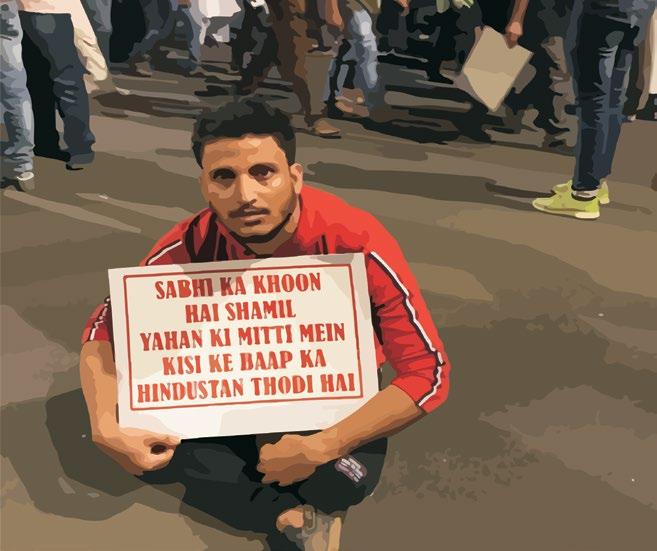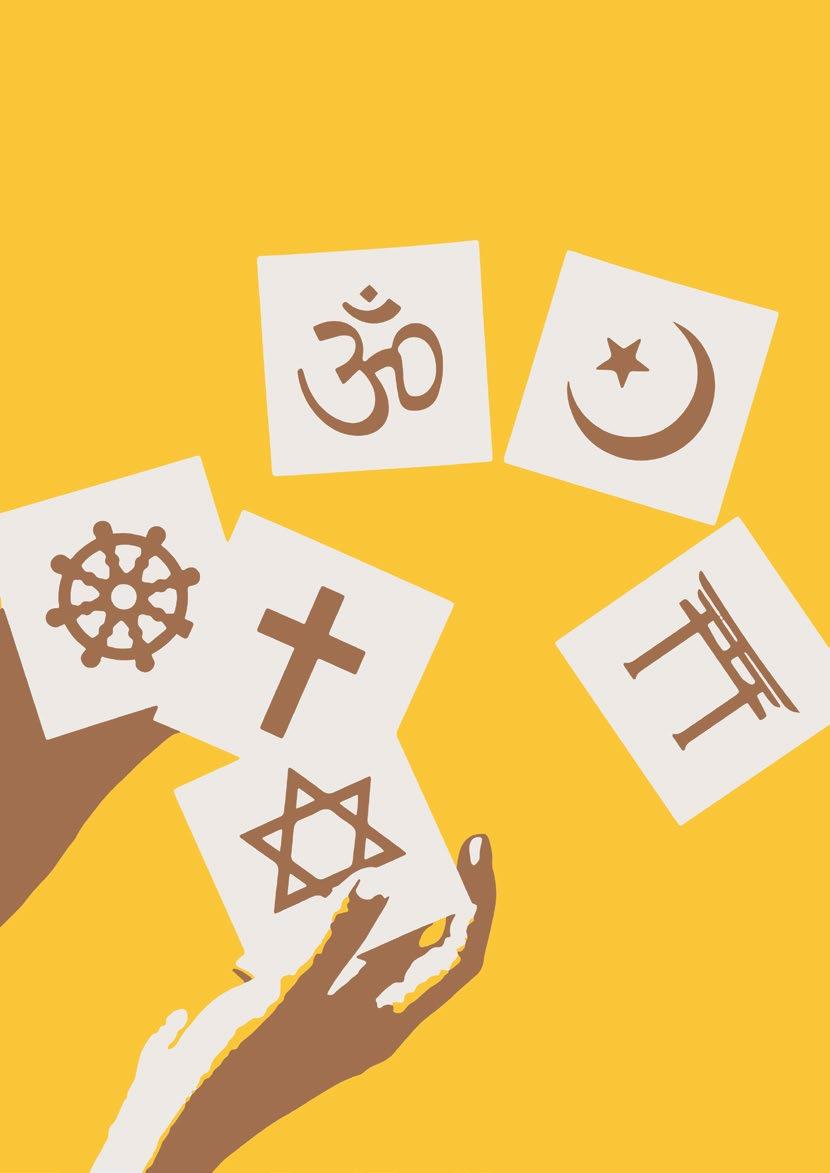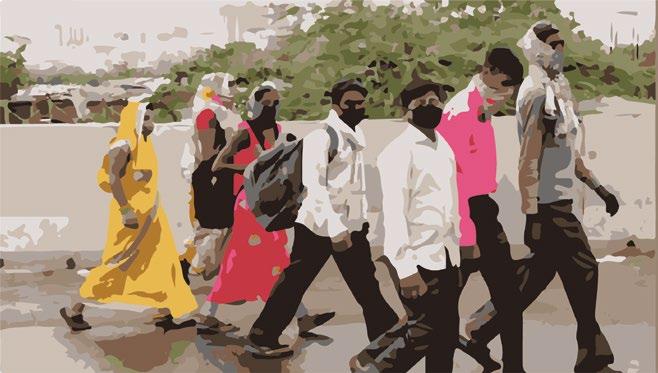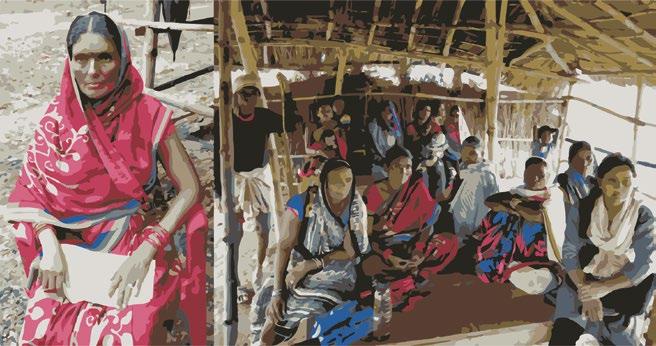
8 minute read
All India
The impending citizenship crisis in India
The Citizenship Amendment Act (CAA) was passed by both houses of the Indian Parliament, without requisite debate, on December 9 and 11, 2019.2 The proposed amendments have drawn huge criticism since 2014 when they formed the basis of the Narendra Modidriven Manifesto of the Bharatiya Janata Party (BJP). For the first time in Indian law, defying Constitutional non-negotiables like the equality before the law and equal protection before the law (Article 14) and right to life with dignity and without discrimination (Article 21, 15-16),3 religion-based discrimination is being legitimized. The amendments in India’s 1955 Citizenship Act enables any person belonging to Hindu, Sikh, Buddhist, Jain, Parsi or Christian community from Afghanistan, Bangladesh or Pakistan, who entered India on or before December 31, 2014 to more efficiently, in a shorter span of time, get citizenship by naturalization. Muslims from these countries are not entitled to this fast track process and other neighbouring countries like Myanmar, Nepal and Sri Lanka are also excluded.4
The problem does not end here. Along with these amendments the threatened all-India National Register of (NRC) along with the National Population Register (NPR) could deal body blows to the country’s secular foundations. In fact, the aggressive tones used to electorally use this chronology of selective exclusion by none less than India’s Minister for Home Affairs, Amit Shah,5 where he even used derogatory terms like “termites” for refugees, not only revealed the true intent of the Modi government, but also spawned creative and spontaneous protests. In fact, to curtail these citizens voices, even before the COVID-19 pandemic and lockdown, emergency provisions were brought in.6
This lethal combination of CAA +NPR+NRC could cause social strife and generate
bad blood between communities, while also causing irreparable damage to the basic structure of the Constitution and democracy as a whole.
Current scenario
Considering that the country is plagued with an unprecedented health crisis due to COVID-19, the government has put the NPR-NR(I)C exercise temporarily on hold. However, given the poor performance of the Modi regime on the economic front there is no reason to believe that such a non-productive and potentially divisive process will not be announced in 2021 ! The problems in having a country-wide NRC are already reflected in the NRC that already has created havoc in the state of Assam and has impoverished thousands of households, leading to several deaths either due to suicide for fear of being declared a foreigner or by death in the detention camp itself. It has been observed that about 69 % of the 1.9 million people who are out of the NRC in Assam are women. This shows that the method of asking people to furnish documents to prove their citizenship means that the NRC can only catch those who lack the required documents and not illegal immigrants. How are CAA, NPR and NRC related?7 The government announced the launch of the NPR while denying that it was beginning the process of an all India NRC, however the Rules that are part of the 2003 Amendment to the Citizenship Act of 1955 clearly link the two. The NPR is a process mandated under the Rules drafted by the first NDA Govt under Atal Bihari Vajpayee in 2003. Under the Citizenship Act 1955 and the Citizenship (Registration of Citizens and issue of National Identity Cards) Rules, 2003, junior level government employees (typically under political pressure and prone to unaccountable functioning and corruption) are empowered –if the national government announces such a process –to conduct door to door enumeration of citizens. There is no clarity in the existing Rules about what documents will or will not be demanded. Based on this enumeration data, this government employee has the power to segregate and declare any person as a ‘doubtful citizen’ and exhibit a list of the same. In Assam, the nonConstitutional Foreigners’ Tribunals have non-judiciously led to the further misery of hundreds of thousands. What will the procedure for adjudication be for those excluded under India’s Citizenship law of 1955 ?8
Widespread protests by citizens, especially Muslims erupted. Even the political opposition stood against the CAA-NPR-NRC. The iconic Shaheen
Bagh protests with Muslim women of all
generations9 at the forefront captured the imagination of India and the world.
The strong arguments behind these agitations were this: the problem with CAA+NPR+NRC is that it is not only discriminatory towards Muslims but also puts many other sections at a disadvantage; especially those who, due to their social status, do not have access or lose access to documents that could prove their citizenship. These include, the marginalized,10 the extremely poor, the undocumented citizens, women who move to their husband’s house after marriage and even shift cities or towns, Adivasis or tribal communities, orphans and abandoned children, members of LGBTQIA community who are mostly disowned at birth by their families, disabled persons, people who lose their documents as they live in flood prone areas or have lost documents due to a one-time natural calamity and the list of the disadvantaged could go on.
CAA violates Constitutional secular principles and is a violation of Articles 13, 14, 15, 16 and 21 which guarantee the right to equality; equality before the law and non-discriminatory treatment by the Indian State.There is no way for a Muslim who is declared an ‘illegal migrant’ to get citizenship in India.Indian Muslims could be badly affected by CAA+NRC, because those Muslims who do not have the documents required to prove their citizenship in a nationwide NRC could
Anti-CAA protest in Mumbai Image: cjp.org.in

be declared as illegal migrants and they would not be able to use CAA, like nonMuslim Indians perhaps could, to get citizenship by lying and claiming that they are illegal migrants from Bangladesh, Pakistan and Afghanistan.11
Legislative background
The CAA amends the definition of “illegal migrant” under the Citizenship Act, 1955 and provides that any person belonging to Hindu, Sikh, Buddhist, Jain, Parsi or Christian community from Afghanistan, Bangladesh or Pakistan, who entered into India on or before December 31, 2014 is not an illegal migrant. This citizenship is to be given under citizenship by naturalization, which is one of the modes of gaining citizenship in India. Further it says that any proceeding pending against a person in respect of illegal migration or citizenship shall stand abated on conferment of citizenship to him and that even if such proceeding is pending against any person, he will not be disqualified from applying for citizenship under naturalization. However, this amendment is not applicable to scheduled areas of Assam, Meghalaya, Mizoram or Tripura. The legal provision for NPR is in The Citizenship (Registration of Citizens and Issue of National Identity Cards) Rules, 2003 formulated under the Citizenship Act, 1955.12
The present Indian government thereafter announced that the Decadal Census Registration process would go hand in hand with the proposed NPR-NRIC. However the standards of information in the two processes are completely different.13 The former is meant as a demographic pointer for government to formulate policies and schemes whereas the latter is intended towards an identification of citizens.
January 2020: Government announced that the NPR update process (there was a previous process conducted for the Aadhaar card process around 2010) along with the House-listing phase of Census 2021 which was slated to begin on April 1, 2020 but the pandemic has delayed the government’s plans. NPR will include door-to-door survey conducted by government employees, just like the Census but the data collected is set to be the kind that will enable authorities to segregate doubtful citizens from that list and then give a chance to these doubtful citizens to submit their documents and then, finally, prepare a National Register of Indian Citizens or NRIC, excluding those who are unable to provide any documentary proof of their citizenship. One can draw the connection between NPR and NRC from the law itself. As per the preparation methodology prescribed in Citizenship (Registration of Citizen & Issue of National Identity Cards) Rules 2003, it is from the NPR that data will be taken for updating the Local Register of Indian Citizen (i.e. part of NRC) after scrutiny and verification.
Judicial intervention
After the CAA was passed by the Parliament and received the President’s assent, several petitions were filed before the Supreme Court seeking that the law be declared unconstitutional for being ultra vires of the Constitution and for violating the basic structure of the Constitution. More than 140 petitions were filed before the apex court14, either in support or opposing the CAA. The
petitioners pleaded for an interim stay or a stay on the NPR. The court, however, refused to grant stay before hearing out the government. The center, then submitted a detailed affidavit before the court stating that (CAA) is “perfectly legal and constitutional” and could not be questioned before a court as it does not impinge upon any existing rights of a citizen.
The petitions are now pending before the apex court as physical functioning of the court has been stopped owing to the COVID-19 threat and only few matters are heard every day by benches via video conferencing mode.
The way forward
Scrap the CAA 2019 or amend it further to include Muslims from Pakistan, Afghanistan and Bangladesh to be granted citizenship, at par with other religious communities Stop the process of NPR-all India NRC completely as this threatens to not only impact India’s social harmony but cause all people huge resources besides punching a hole in the state’s exchequer: the process has already cost the state of Assam about Rs. 16 billion to carry out NRC between 2013-2019.
1) https://indianexpress.com/article/opinion/columns/ citizenship-amendment-actprotests-protests-violence-nrc-modigovt-6213319/ 2) https://www.theweek.in/news/india/2019/12/12/full-text-the-citizenship-amendmentbill-2019.html 3) https://cjp.org.in/why-the-caa-must-be-opposed-because-it-discriminates/ 4) https://thewire.in/law/citizenship-amendment-bill-unconstitutional 5) https://scroll.in/article/947436/who-is-linking-citizenship-act-to-nrc-here-are-fivetimes-amit-shah-didso https://indianexpress.com/article/india/npr-nrc-link-amit-shahcentral-government-parliament-6183572/ 6) https://www.theguardian.com/world/2019/dec/18/india-clamps-down-againstcitizenship-law-protests 7) https://cjp.org.in/npr-nrc-faqs/; https://cjp.org.in/how-dangerous-is-the-caa-nrc/ 8) https://www.timesnownews.com/india/article/kerala-cm-pinarayi-vijayan-gives-threereasons-for-rejecting-caa-hereswhat-he-said/548466 9) https://www.hindustantimes.com/india-news/bilkis-dadi-of-shaheen-bagh-on-time-slist-of-100-influential-people/storyWxcXIuH1ApLLKxuc13p8AN.html 10) https://cjp.org.in/indias-poorest-citizens-will-bear-the-brunt-of-npr-nrc/ 11) https://cjp.org.in/teesta-setalvad-addresses-massive-crowd-on-caa-npr-nrc/ 12) https://cjp.org.in/citizenship-laws-in-india-faqs/ 13) https://cjp.org.in/npr-manual-released/ 14) https://cjp.org.in/teesta-setalvad-addresses-massive-crowd-on-caa-npr-nrc/
RELIGION AND CASTE











